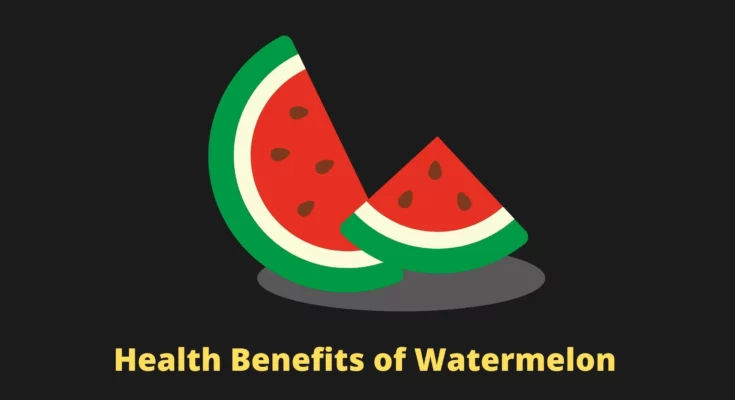Health Benefits of Water Melon
- Introduction of Watermelon
Watermelon is soaked with nutrients. It is deliciously healthy fruit. This is large round fruit. It has a bright red flesh and green rind. It is free of fat. It is low in calories. According to health line, we can eat all parts of watermelons such as seeds and rind. There are five types of watermelon: mini, yellow, orange, seeded and seedless. According to health line, a watermelon contains approximately 92% water. Each juicy bite of watermelon has significant level of vitamin C, vitamin B6, vitamin A, antioxidants, lots of lycopene and amino acid. It is also contain a significant amount of potassium. Watermelon is a member of Cucurbitaceous family along with cucumber, honey dew and cantaloupe. It is juicy and sweet. During the summer heat, watermelon is a perfect treat to quench our thirst.
Watermelon contains antioxidants and amino acids. Amino acid is the basic building block for protein. Proteins used to perform vital function in body. It also contains Lycopene, which is naturally occurring compound in vegetables and fruits, which works with human body to trigger healthy reactions. It is also known as red pigment. Red pigment gives guavas, tomatoes, red grapefruits and watermelon their color. Half cup and also one cup of watermelon contains 9 to 13 milligrams lycopene, according to the U.S Department of Agriculture.
- Etymology of Watermelon
Watermelon is derived from Medieval Latin word “melonem”. By 13th century, this fruit was introduced in Europe by the Moorish invaders. There, thus word its first appearance in English language.
- Origin of Watermelon
Watermelon is originated in North-eastern Africa. It is the center of origin of the watermelon. Over 4000 years ago, watermelon was domesticated for food and water there. By Approximately 2000 years ago, watermelons emerged in Mediterranean lands.
- History of Watermelon
History of watermelon dates back 5000 years to Southern Africa. Watermelon was being cultivated in India by 7th century. By 10th century, it reached China. Today, the country is the largest watermelon producer across the world. At that place it was tough drought tolerant ancestor of watermelon thrived. In Kalahari Desert region, it was used by indigenous people. Moreover the identity of this plant is not known properly. But we know it was prized for its ability.
- Nutritional Information of Watermelon
Watermelon contains many health benefits.
- Health Benefits of Watermelon
Watermelon is a nutritious fruit. It contains vitamins, minerals and antioxidants which play an important role to prevent human body from various chronic diseases. It has several health benefits which are described below in detailed manner.
- Asthma Prevention
Watermelon may prevent from Asthma. Watermelon contains Vitamin C, which play an important role in the prevention of asthma. Studies showed that, supplements of vitamin C can help to prevent asthma but diet which contains vitamin C can act as a protection of some disease such as asthma.
- Reduce Blood Pressure
Watermelon may reduce blood pressure. Watermelon contains L-argentine (antioxidant), which play an important role to reduce the blood pressure. It also improves the functions of the arteries. Another antioxidant (Lycopene) may help to reduce blood pressure and also help to protect against heart disease.
- Prevent Cancer
Watermelon plays an important role in preventing cancer. Dietary antioxidants such as Vitamin C may help to prevent cancer by combating free radicals. This antioxidant can also help to damage cancer cells.
- Digestion and Regularity
Watermelon plays an important role in digestion and regularity. It has high water content. It provides fibre. These nutrients help to promote a healthy gut and also prevent from constipation. It also promotes the regularity of bowel movements.
- Source of Hydration
Watermelon is a source of hydration. It provides around 90% water. This makes it a healthful choice in summer to hydrate the body in an effective way.
- Brain and Nervous System
Watermelon is beneficial for our brain and nervous system. Watermelon contains chlorine (antioxidant) which play an important role in our brain and nervous system. It contributes to improve Brain Development, to Stronger Muscle Movement, to Improve Learning and Memory, to Maintain structure of Cell membrane and to Transmit Nerve Impulses.
- Muscle Soreness
Watermelon plays an important role in muscle soreness. It improves the recovery time following exercise in athletes and also reduce the muscle soreness.
- Promote Healthy Skin
Watermelon promotes healthy skin. It contains Vitamin C. Vitamin C is involved in formation of the collagen which is the protein which play an important role to scaffold to skin keep in it firm and plump. It is one of the most important antioxidants which play an important role to protect against environmental damage. Deficiency of Vitamin C can affect wound healing and also increase wrinkles and fine lines.
- Improves the Features of Metabolic Syndrome
Watermelon may improve the features of metabolic syndrome. A study was conducted in 2019, in which researchers found that, watermelon improves the features of metabolic syndrome such as cardiovascular measures and obesity.
- Diuretic Properties
Watermelon has diuretic properties. Many people use diuretic as drugs to help their body to remove excess salt and excess water. This is also useful for people suffering from high blood pressure, kidney problems and many other conditions.
Summary
To sum up, it can be concluded that, watermelon has great benefits for our body. It has water content in high level. It provides nutrients such as Vitamin A, Vitamin C, and Lycopene. It can also conclude that, it may boost our heart health. It reduces muscle soreness. It may also decrease inflammation. That is why it is said that watermelon is very beneficial for our health because it has great health benefits for human body as well as human brain.



